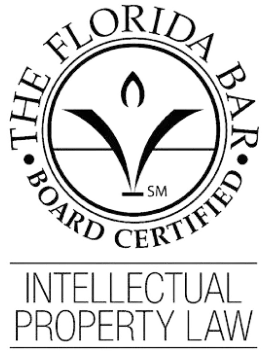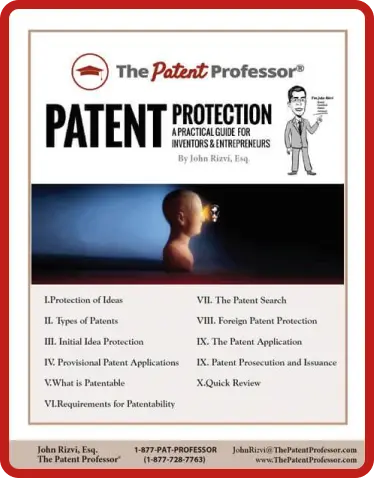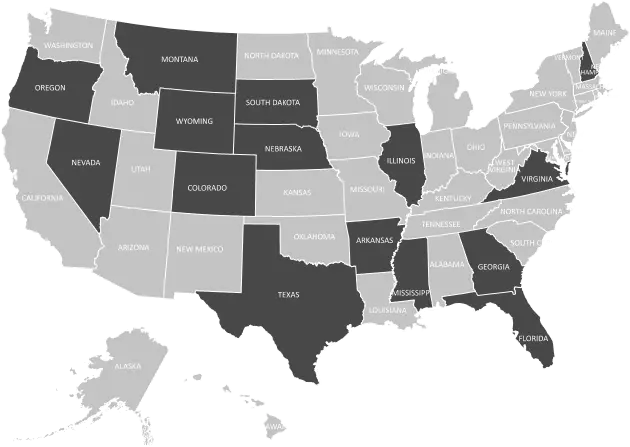The incredible pace of e-commerce is sending shock waves throughout the business and legal community. The value of intellectual property protection on the Internet is becoming clear as established companies find that they can no longer rely upon physical barriers to competition. Internet cyberlaw in Florida and other states is an important necessity for businesses of all sizes. Traditional barriers to entry such as real estate location, show room space, distribution channels, retail outlets, and years of market research no longer provide the insulation against new competition that they once did. Protection is provided through internet laws and internet copyright laws.
For the first time in history, newcomers to mature industries are immediately posing credible competitive risks. The overnight entry of Amazon.com into the mature and established book retailing industry has served as a wake-up call to business leaders everywhere to protect their innovations.
Patents are not just for “science” anymore but are increasingly used by banks, real estate firms, stockbrokers, insurance companies, and retailers to protect novel methods of doing business. Trademark registrations have reached a frenzied pace as the importance of brand recognition on the Internet is fully realized. Copyright laws are striving to adapt to a new medium where infringement is many times only a mouse-click away. Internet cyberlaw assists companies who are adopting traditional intellectual property doctrines and utilizing new developments such as domain name registration and administrative dispute resolution procedures to protect and stake-out propriety claims in cyberspace.
The Internet lawyers at John Rizvi and continue to concentrate in the area of intellectual property law both in traditional venues and on the Internet as the law races to keep pace with technology and e-commerce.
For technology-based companies, being the first one to market a new product or service offers incredible competitive advantages. Traditionally, the first company to capitalize on a new idea will enjoy a lead-time advantage in setting manufacturing, marketing, and distribution channels in place. This head start provides the originator of a new product or service with the opportunity to perfect commercial development of the idea, cultivate brand recognition, and begin building consumer loyalty.
Many Internet-based business methods and innovations may be reverse-engineered or copied within a matter of days…
Unfortunately, however, many inexperienced businesses and entrepreneurs fail to recognize that the advantages they have of being first been only temporary. Without adequate legal protection, it is only a matter of time before internet competitors will enter the market and drive down prices. How much time a new start-up has before competitors enter the field depends upon the nature of the new technology and the barriers to entry. For example, many Internet-based business methods and innovations may be reverse-engineered or copied within a matter of days. Traditional manufacturing-based inventions, on the other hand, may take longer to duplicate due to the need for special moldings, parts, machinery, and equipment. In either case, the first-to-market advantage is short-lived. To make matters worse, competitors entering a market after the initial product release are often able to improve upon the original concept by studying the development and marketing mistakes made by the first-entrant in the field.
Investors and venture capitalists are starting to realize that without legal protection, a new start-up with a great idea is sending an open invitation to competitors.
The ability of a start-up to obtain proprietary legal protection for its ideas has become a major concern to investment firms and venture capitalists as the Internet boom begins to level off. A year ago, the market may have been a little different. In the intense white-hot competition for Internet deals, inexperienced investors were willing to overlook weak intellectual property assets. Not anymore. Dot-com bankruptcies will continue to rise as companies with similar technology and business methods compete to “outspend and underprice” each other. Investors and venture capitalists are starting to realize that a great idea without any barriers to entry is an open invitation for competition.
Today, start-ups are being asked to demonstrate an ability to maintain their competitive advantages. Being first in the market with an innovative new business method, product, or service is great. But you must prevent others from duplicating it. This is done through a variety of legal doctrines including patents, trademarks, copyrights, trade secrets, and contractual agreements.
It should be expected that a development as radical as the Internet would spark a patenting explosion. The boom in Internet-related, software, and business method patents has certainly not been without controversy. Some argue that many of the new patents on these innovations are too broad in scope and should be invalidated. Others have lost confidence in the U.S. Patent and Trademark Office’s ability to properly evaluate software and Internet-related innovations. For high-tech companies, applying for patent protection simply makes good business sense. It is not unusual in technically crowded fields for businesses to protect improvements in known devices with a broad array of patent protection. These multiple patents can be used to leverage negotiations and often lead to cross-licensing arrangements between rivals in the same field.
In the information age, patents are clearly the most sought after way to protect new technological innovations. In its simplest form, a patent is a monopoly granted by the United States Government to an inventor to enable the inventor to exploit his creativity. A patent permits an inventor to exclude others from making, using, selling, or importing an invention throughout the United States without the inventor’s permission. By providing inventors with the security that they will enjoy the fruits of their hard work and ingenuity, patents encourage innovation.
There are different types of patents available in the United States: utility patents, design patents, and a plant patents. A utility patent protects the function of an invention and has a term of 20 years from the date of filing. Design patents, on the other hand, only protect the overall appearance of an invention and have a term of 14 years from the date of issuance. A plant that an inventor has produced asexually (without seeds) may be protected by filing a plant patent. Plant patents have a term of 20 years from the date of filing.
There are certain deadlines, which an inventor must meet in order to avoid the loss of patent rights. One of these is that in the United States an inventor must file a patent application with the United States Patent and Trademark Office within one year of the first date on which the invention was offered for sale or made public. Failure to do so will result in a loss of all patent rights. Entrepreneurs should be careful in revealing a new innovation or business method to a venture capitalist without adequate legal protection. The terms “offer for sale” and “public disclosure” are interpreted broadly and encompass a wide variety of fact patterns. In many foreign countries, patent rights are lost once a public disclosure or offer to sell an invention is made.
Establishing a business identity on the Internet has taken on a feverish pace as e-commerce businesses struggle to build and develop consumer loyalty and brand recognition. The importance of building brand identity will become even more pivotal as the online landscape thickens. In cyberspace, adequate trademark protection for a business or its products or services is simply indispensable. Inexperienced entrepreneurs often overlook the importance of properly securing these rights in the start-up phase of their business. Mistakes at these early stages of choosing and protecting names can be very costly. A trademark is a word, logo, design, or even a combination of these. A service mark is similar to a trademark except that it is used to express the origin of services. Trademarks and service marks are used to identify a business or its products or services. Consumers identify trademarks with a particular quality of goods or services. They continuously increase in value as the products or services they represent gain brand recognition and consumer loyalty.
The interaction between trademarks and domain names has created a minefield of potential dangers to businesses. Without proper trademark protection, a company’s reputation and goodwill can be “kidnapped” by cybersquatters. A cybersquatter is an individual or business that registers a domain name on the web with the intention of ransoming it for sale. A company with proper trademark protection is safeguarded against from cybersquatters by the Anticybersquatting Consumer Protection Act, which became law in 11/1/1999. Obtaining a trademark on your company’s name or products helps provide quick and effective recourse to your marks in the event that someone tries to hold your company or product name hostage. A trademark not only prevents others from using an exact duplicate of your registered mark, but also prevents the use of confusingly similar marks.
Before launching a new product or service, it is important to undertake a comprehensive trademark search and obtain a clearance for your mark. Inexperienced Internet entrepreneurs have invested considerable sums of time and money promoting a new web-based business only to have their marketing efforts made useless because their mark was already in use by another company.
Important components of high-technology businesses may lend themselves to copyright protection. A copyright protects the original expression of an idea, whether literary, artistic, commercial or otherwise. It is used to protect original works of authorship that are fixed in a tangible medium of expression. Some examples of original works that may be protected with a copyright include books, sales brochures, advertising, instruction manuals, architectural and engineering drawings, pictures, photographs, paintings, graphical images, web-site designs, computer software, music, and sound recordings. Copyright protection generally lasts for 70 years after the author’s death.
Under current law, copyright protection attaches to a work whether the copyright owner registers the work with the U.S. Copyright Office. However, registration is required before an infringement lawsuit can be filed. Also, registering a copyright within three months of the work’s first publication entitles the owner to statutory damages and attorney fees in an infringement action. Copyright registration is inexpensive and it is advisable to register any work believed to be of value.
The owner of a copyrighted work has the exclusive right to reproduce the work, prepare derivative works based upon the work, distribute copies of the work to the public, perform the work publicly, and display the work publicly. One significant disadvantage of copyright protection, however, is that “independent creation” is a valid defense to an infringement action. In other words, a defendant can avoid liability as long as he or she can show that they did not copy from the earlier work.
Sometimes the nature of a new method of doing business or a new idea does not lend itself to effective patent, trademark, or copyright protection. It may still be possible to provide some protection for these ideas through contract or trade secret law. Unlike patent, trademark, and copyright law, the law relating to contracts and trade secrets is based on state law and may differ from state to state.
Trade secrets are generally defined as proprietary or confidential information used in a business. Trade secrets must have commercial value or provide a competitive edge. Examples of trade secrets include customer or supplier lists, marketing plans, formulas for compositions (soft drinks), and manufacturing processes. In order to qualify for trade secret protection, the subject must be sufficiently secret so that the use of improper means is necessary for competitors to obtain it.
A common way for businesses to establish rights to a trade secret is by entering into agreements requiring signing parties to be bound to maintain confidentiality. Many entrepreneurs and businesses are familiar with non-disclosure or confidentiality agreements. A non-disclosure agreement can be used by high-tech businesses that enter into arrangements with suppliers, vendors, sub-contractors, employees, and even customers that may require them to reveal important components of their technology or business methods. Unfortunately, a non-disclosure agreement provides no protection to a company against a competitor who is not a signatory to the agreement and who independently creates a competing product. Such protection can only secured by filing a patent application.
In today’s hyper-competitive business environment, the potential valuation of a business lies to a great extent in its ability to capitalize upon its creativity and innovation. In many cases, the greatest assets of a new venture may very well be its new ideas. The value of new ideas, however, comes from transforming them into practical and useful products and obtaining legal protection to prevent others from infringing on your market. Our expertise in internet cyberlaw can help! Success is an open invitation to the competition. And without legal protection for their new innovations, today’s successful businesses and aspiring entrepreneurs are finding that being first is only the beginning.
If you have any questions concerning our Internet Lawyer services, call us today
We respect your privacy. The information you provide will be used to answer your question or to schedule an appointment if requested.
Florida Bar Board Certified Intellectual Property Attorney


Florida Bar Board Certified
Intellectual Property Attorney

Do you have an idea, product or service you'd like to protect? Don't let your idea get stolen!

Do you have an idea, product or
service you'd like to protect? Don't let
your idea get stolen!
At The Idea Attorneys®, we have dedicated our practice exclusively to securing and preserving the intellectual property rights of our clients, including patent, trademark, copyright, trade secret, unfair competition, and franchising matters.


Powered by Law Firm Marketing Pros

Powered by Law Firm Marketing Pros